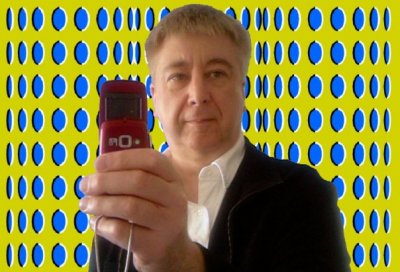|
Introduction
If you are entering your second year at Aber why not consider joining us on this module in
September? It runs in Semester One and there are no exams, if you were wondering!
As anyone who has been taught by me will know, I am a very visual person indeed and this is reflected in my teaching style,
particularly in the way in which I use Powerpoint slides! This is the most intensively visual module that I teach: it focuses
entirely on visual perception (as well as introducing some visual semiotics), and uses as examples some amazing head-spinning
optical illusions, drawings, paintings, photographs and advertisements. Warning: this module may leave you feeling giddy,
hallucinating and disoriented-all without a hangover!
Most people assume that their visual perception of the everyday world, making sense of pictures and watching films and TV involve relatively 'passive' processes of assimilation by
the 'receiver'. Our exploration of the openness of visual texts to interpretation challenges such assumptions. You will
discover that a great deal of what you think you see is not in the world but in your mind. Students of the visual arts should
find it transformational. For MCS students this module is central to our concern with visual media. For Film and TV students, it is
highly relevant for viewer-oriented studies. For performance and scenography students it explores
fundamental spatial concepts. Marketing students have found that opens their minds to new possibilities.
Try it - you might like it! Don't take my word for it though... Joe Burns (graduating class of 2008) asked me to tell you that:
'Reading the Visual was amazing-like a sherbet-filled nuclear explosition. When you leave the lectures it's like your head's
been blown off your shoulders-shot out of a cannon. So intense!' Deborah Leigh Quigley (First Year student, 2007-8) declared:
'The format of the workshops really worked for me-having visual slides allowed me to pay full attention to what was being
discussed without worrying about taking notes, then having the notes available to look over after lectures. Involving the
class (asking questions and getting us to vote on how we personally perceived an image) during lectures, kept me engaged,
interested and, a lot of the time, amazed by what I found out.'
|
